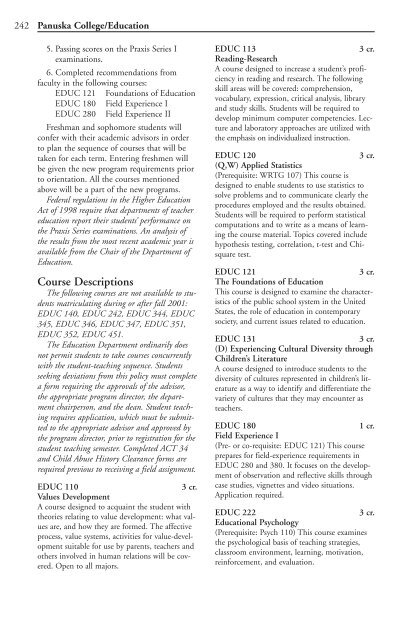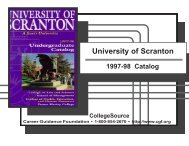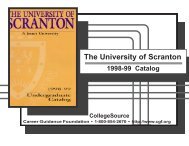2003-2004 - The University of Scranton
2003-2004 - The University of Scranton
2003-2004 - The University of Scranton
You also want an ePaper? Increase the reach of your titles
YUMPU automatically turns print PDFs into web optimized ePapers that Google loves.
242 Panuska College/Education<br />
5. Passing scores on the Praxis Series I<br />
examinations.<br />
6. Completed recommendations from<br />
faculty in the following courses:<br />
EDUC 121 Foundations <strong>of</strong> Education<br />
EDUC 180 Field Experience I<br />
EDUC 280 Field Experience II<br />
Freshman and sophomore students will<br />
confer with their academic advisors in order<br />
to plan the sequence <strong>of</strong> courses that will be<br />
taken for each term. Entering freshmen will<br />
be given the new program requirements prior<br />
to orientation. All the courses mentioned<br />
above will be a part <strong>of</strong> the new programs.<br />
Federal regulations in the Higher Education<br />
Act <strong>of</strong> 1998 require that departments <strong>of</strong> teacher<br />
education report their students’ performance on<br />
the Praxis Series examinations. An analysis <strong>of</strong><br />
the results from the most recent academic year is<br />
available from the Chair <strong>of</strong> the Department <strong>of</strong><br />
Education.<br />
Course Descriptions<br />
<strong>The</strong> following courses are not available to students<br />
matriculating during or after fall 2001:<br />
EDUC 140, EDUC 242, EDUC 344, EDUC<br />
345, EDUC 346, EDUC 347, EDUC 351,<br />
EDUC 352, EDUC 451.<br />
<strong>The</strong> Education Department ordinarily does<br />
not permit students to take courses concurrently<br />
with the student-teaching sequence. Students<br />
seeking deviations from this policy must complete<br />
a form requiring the approvals <strong>of</strong> the advisor,<br />
the appropriate program director, the department<br />
chairperson, and the dean. Student teaching<br />
requires application, which must be submitted<br />
to the appropriate advisor and approved by<br />
the program director, prior to registration for the<br />
student teaching semester. Completed ACT 34<br />
and Child Abuse History Clearance forms are<br />
required previous to receiving a field assignment.<br />
EDUC 110 3 cr.<br />
Values Development<br />
A course designed to acquaint the student with<br />
theories relating to value development: what values<br />
are, and how they are formed. <strong>The</strong> affective<br />
process, value systems, activities for value-development<br />
suitable for use by parents, teachers and<br />
others involved in human relations will be covered.<br />
Open to all majors.<br />
EDUC 113 3 cr.<br />
Reading-Research<br />
A course designed to increase a student’s pr<strong>of</strong>iciency<br />
in reading and research. <strong>The</strong> following<br />
skill areas will be covered: comprehension,<br />
vocabulary, expression, critical analysis, library<br />
and study skills. Students will be required to<br />
develop minimum computer competencies. Lecture<br />
and laboratory approaches are utilized with<br />
the emphasis on individualized instruction.<br />
EDUC 120 3 cr.<br />
(Q,W) Applied Statistics<br />
(Prerequisite: WRTG 107) This course is<br />
designed to enable students to use statistics to<br />
solve problems and to communicate clearly the<br />
procedures employed and the results obtained.<br />
Students will be required to perform statistical<br />
computations and to write as a means <strong>of</strong> learning<br />
the course material. Topics covered include<br />
hypothesis testing, correlation, t-test and Chisquare<br />
test.<br />
EDUC 121 3 cr.<br />
<strong>The</strong> Foundations <strong>of</strong> Education<br />
This course is designed to examine the characteristics<br />
<strong>of</strong> the public school system in the United<br />
States, the role <strong>of</strong> education in contemporary<br />
society, and current issues related to education.<br />
EDUC 131 3 cr.<br />
(D) Experiencing Cultural Diversity through<br />
Children’s Literature<br />
A course designed to introduce students to the<br />
diversity <strong>of</strong> cultures represented in children’s literature<br />
as a way to identify and differentiate the<br />
variety <strong>of</strong> cultures that they may encounter as<br />
teachers.<br />
EDUC 180 1 cr.<br />
Field Experience I<br />
(Pre- or co-requisite: EDUC 121) This course<br />
prepares for field-experience requirements in<br />
EDUC 280 and 380. It focuses on the development<br />
<strong>of</strong> observation and reflective skills through<br />
case studies, vignettes and video situations.<br />
Application required.<br />
EDUC 222 3 cr.<br />
Educational Psychology<br />
(Prerequisite: Psych 110) This course examines<br />
the psychological basis <strong>of</strong> teaching strategies,<br />
classroom environment, learning, motivation,<br />
reinforcement, and evaluation.
















